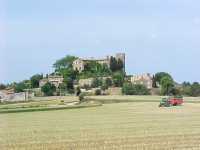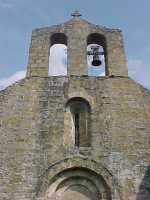Foixà
- Castell de Foixà
- Sant Llorenç de les Arenes
FOIX└ CASTLE
 The
existence of FoixÓ castle can't be traced in documents previous
to the second half of the XIIIth. century; however, it's mentioned
by a lord of this area in 1192. For this reason, the exact date
cannot be established.
The
existence of FoixÓ castle can't be traced in documents previous
to the second half of the XIIIth. century; however, it's mentioned
by a lord of this area in 1192. For this reason, the exact date
cannot be established.
The strategic situation of the spot where it was erected could
explain the possibility of a former fortification there. The hill
where this castle was built outlooks all the old Empuries county.
The large palace consists of two attached T-shaped buildings,
two inner courtyards, a couple of floors, a semicircular tower
(the oldest remaining part today) and a chapel. In the coat of
arms a lion appears right in the centre and it's surrounded by
eight fleurs de lis. All the fašades have rectangular large windows.
Inside the building we find the prison, the stables and the cellar.
These rooms show the shapes of the canes used in the vault moulds.
The vault of the kitchen is really striking because of its palm-tree
shape. The tower is 12meters high. The chapel is dedicated to
Saint Marc. On the aisles there are 2 Gothic tombs. In one of
them was buried Bernat Guillem de FoixÓ and it's really of great
interest. In the other one Guillem de Foixa and his son Friar
Alemany were buried.
Most of the building was rebuilt mainly during the XVIth. and
the XIXth. centuries. Only the tower and the chapel have remained
original.
SANT LLORENă DE LES ARENES
 The church of Sant Llorenš de les Arenes was built in the XIIIth.
century. It was founded by count Ponš-Hug II. It has a nave with
a semicircular apse, which belongs to the third period of the
Romanesque period. On the western fašade there is a main entrance
with 3 arches whose ends lie on the wall; there's also a lintel
and a tympanum. It's a typical technique used in la Garrotxa and
El Baix EmpordÓ. On the fašade there is a belfry with two round
arches.T his church is one of the most remarkable monument from
the 3rd. period of Romanesque style in el Baix EmpordÓ. Sant Llorenš
is really well-preserved. Inside the church we find a Baroque
font decorated with geometric patterns together with bas-relief
heads.
The church of Sant Llorenš de les Arenes was built in the XIIIth.
century. It was founded by count Ponš-Hug II. It has a nave with
a semicircular apse, which belongs to the third period of the
Romanesque period. On the western fašade there is a main entrance
with 3 arches whose ends lie on the wall; there's also a lintel
and a tympanum. It's a typical technique used in la Garrotxa and
El Baix EmpordÓ. On the fašade there is a belfry with two round
arches.T his church is one of the most remarkable monument from
the 3rd. period of Romanesque style in el Baix EmpordÓ. Sant Llorenš
is really well-preserved. Inside the church we find a Baroque
font decorated with geometric patterns together with bas-relief
heads.